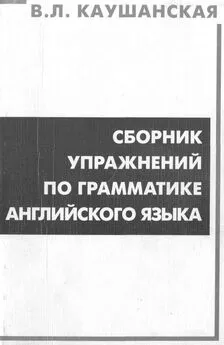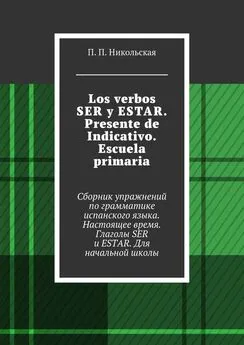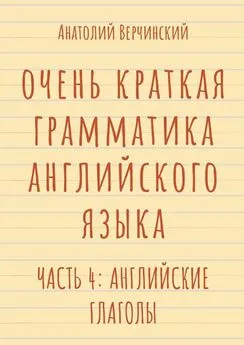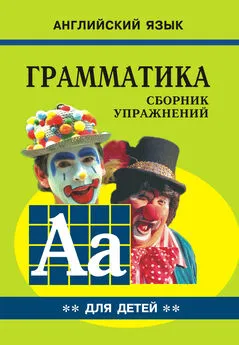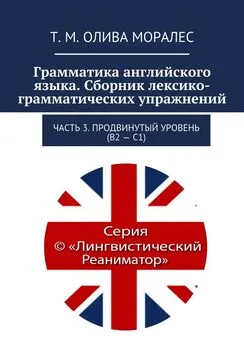В. Каушанская - Сборник упражнений по грамматике английского языка
- Название:Сборник упражнений по грамматике английского языка
- Автор:
- Жанр:
- Издательство:неизвестно
- Год:неизвестен
- ISBN:нет данных
- Рейтинг:
- Избранное:Добавить в избранное
-
Отзывы:
-
Ваша оценка:
В. Каушанская - Сборник упражнений по грамматике английского языка краткое содержание
Сборник упражнений по грамматике английского языка - читать онлайн бесплатно полную версию (весь текст целиком)
Интервал:
Закладка:
1. I have not visited the place yet. I __ there to-morrow. (to go) 2. Our train __ at 8 p. m. to-morrow, so if you __ at 5 o'clock we __ still __ (to start, to come, to pack) 3. At 4 o'clock tomorrow we __ packing and by 6 we __ with ease, (to begin, to finish) 4. __ you __ dinner by the time I come back? (to have) 5. Ring me up at II, I __ yet. (to sleep—negative)
1. I __ on my round by the time you go, so I'll say good-bye to you now. (to start out) (Maugham) 2. "I think you __ him," said Elinor, "when you know more of him." (to like) (Austen) 3. "Shall we go downstairs and meet the man?" "Let us stay here; he __ at our door in a moment, you will see," said Sylvi- ane. (to knock) (Bennett) 4. As a number of episodes from this novel __ the public through their wireless sets before it is published, a few words of explanation are necessary, (to reach) (Priestley) 5. I suppose everyone __ me questions and it's so awkward. (to ask) (Christie) 6. But you __ I won't let you. (to.go — negative) (Murdoch and Priestley) 7. "When __ I __ your brother?" said Georgie. (to meet) (Murdoch) 8. What __ you __ this afternoon? (to do) (Galsworthy)
1. Они начнут строительство клуба в ближайшие дни и закончат его к концу года. 2. Не звоните ей в одиннадцать часов. Она уже будет спать. 3. Позвоните в семь часов. Я думаю, что к этому времени машинистка уже напечатает ваши документы. 4. Я еще буду работать, когда вы вернетесь.
1. Я тебе вечером позвоню, часов в восемь. (Слепухин) 2. В субботу вечером я вас жду. (Достоевский) 3. На днях я буду у вас. (Достоевский) 4. Надеюсь, вы поймете меня. (Достоевский) 5. Доктор, я жду вас завтра в четыре часа. (Лермонтов) 6. Я тоже еду в МильЕенский завод. (Пермяк) 7. В котором часу ты будешь дома? (Слепухин) 8. Приходите завтра на турнир часа в два... Я буду вас ждать. (Котов) 9. Запомни: завтра в пять. К этому времени, надеюсь, у тебя настроение изменится. (Тендряков) 10. Зина и Настасья Ильинична уезжают?.. Куда они уезжают? (Слепухин) 11....вы завтра идете в цирк? (Слепухин) 12....что ты собираешься делать? — Не знаю. (Чаковский)
1. I __ him since he came back from the East, (to see — negative) (Greene) 2. "Ever since I was a young girl," said Miss Ley, "I __ not to take things seriously..." (to try) (Maugham) 3. I will be your friend: I __ always __ you. (to like) (Ch. Bronte) 4. Your wife flies into a temper and stabs a man you __ with for over a year, (to work) (Hilton) 5. I __ for a long time to make you a little present, Bertha, (to want) (Maugham) 6. Lord Caversham __ some time in the library for Sir Robert, (to wait) (Wilde) 7. I __ to England for sixteen years, (to be — negative) (Maugham) 8. I suppose you know, Peggy dear, I __ awfully fond of you for quite a long time, (to be) (W. Locke) 9. It is highly probable you __ with him for the last three weeks... (to correspond) (James) 10. They __ the news in the streets since two o'clock, (to yell) (Conrad) 11. "How about playing a little something for me?" he said. "Oh, Lonnie! I __ for ages. And I'll wake the children." (to play — negative) (Benson) 12. The house __ in my charge for more than a year, (to be) (Du Maurier) 13. "I can't remember my aunt's address. We __ from her for years, (to hear — negative) (Christie)
1. Сколько времени вы меня ждете? 2. Я знаю ее уже два года. 3. Я всегда предпочитала трагедию комедии. 4. Они пишут изложение уже два часа. 5. Сколько времени-вы занимаетесь музыкой? 6. Мне уже давно хочется прочесть эту книгу. 7. Я не имею от него писем с августа. 8. Я не видела словаря с тех пор, как вы его взяли из шкафа. 9. Я чувствую себя очень одиноким с тех пор, как брат уехал. 10. Я очень устала. Я готовилась к экзамену по политической экономии. 11. “Он рассказывал мне ужасные истории», — сказала она, когда Олег вышел. 12. Почему вы все так смотрите на меня? Нина вам говорила что-нибудь обо мне?
1. Лена сказала: — Я ищу тебя весь вечер. (Чаковский) 2. Я не ел с утра... (Тендряков) 3. Вы действительно знаете меня шесть лет. (Котов) 4. Я прожила с ним [Ващенковым] много лет и хорошо его знаю. (Тендряков) 5. Я не видел ее уже два месяца. (Чаковский) 6. Я тебя ждала три дня. (Достоевский) 7. Катерину Федоровну я знал еще с прошлого года. (Достоевский) 8. Они живут поблизости, на улице Жак Колло, около тридцати лет — с тех пор, как приехали в Париж. (Сухомлин)
I. "Oh, Mr. Craddock, let me come near you," cried Mrs. Branderton, "I __ to get at you for twenty minutes." (to try) (Maugham) 2. I __ here all the morning to see either her or Robert. (to wait) (tilde) 3. "What's the matter?" "The matter? The girl's ill. She __ " (to die) (Christie) 4. My dear girl, what __ you __ about now? (to think) (Beresford) 5. I __ so much about it since I received your letter, (to think) (Marryat) 6. I __ the streets of the city for you for two years and this is the first time I've admitted it even to myself, (to search) (/. Shaw) 7. I hear you __ for a new house, (to look) (Lindsay) 8. Of course, we have problems, but we __ to handle them, and I must say, quite successfully, (to learn) (Gow and D’Usseau) 9. When her voice ceased, he moved uneasily and said, "I __ well for the last ten days." (to feel — negative) (Conrad) 10. She __ extraordinary well to-night (to feel) (Wells) 11. What else have I to live for but my children? It's you and the rest of them that I __ and __ for all these years, (to work, to plan) (Dreiser)
1. Зачем вы на меня так внимательно смотрите? (Достоевский) 2. Пойдем, Виктор... Бабушка Броня нас ждет. (Семенихин) 3. А я вас давно жду, товарищ Елена... (Пермяк) 4. Вы меня оскорбляете... извольте выйти вон. (Тургенев) 5. Вот уже два года, как я живу с ней в одном доме. (Тургенев) 6. Что вы тут делаете?.. Букет вяжете? (Тургенев) 7. Она, верно, давно уже наблюдает за мной, ждет, когда я обернусь и замечу ее. (Тендряков) 8. Я уже три дня об этом думаю. (Достоевский)
1. After some desultory conversation, the Director inquired how long he __ Montanelli. (to know) (Voynich) 2. It was almost dinner-time by then, and we __ no food all day, but neither of us was hungry, (to have) (Hilton) 3. We __ in silence for some time when Ah-Yen spoke, (to smoke) (Leacock) 4. The party __ already __ for a week before I could get away from London, (to sail) (Snow) 5. Breakfast __ long __ on the table, when Arthur came tearing into the room, (to be — negative) (Voynich) 6. Me. Morrough, who __ my doctor for some years and __ also my friend, came at once, (to be, to be) (Hansford Johnson) 7.. ..since his arrival in April he __ simply __ round the house, helping Ann with the washing up, running errands, (to hang) (Murdoch) 8. She __ there more than two months when she fell down a flight of steps and hurt her spine, (te be — negative) (Mansfield) 9. He found that he __ stockstill for over half an hour, wrestling with his thoughts, (to stand) (Lindsay) 10. Bertha __ at her husband since he came into the room, unable in astonishment to avert her eyes, (to look) (Maugham) 11. For a week the Gadfly __ in a fearful state, (to lie) (Voynich) 12. After he __ about three hours, he arrived at the Doctor's house, (to walk) (Wilde) 13. The Carrier expected that Tackleton would pay him an early visit, and he was right. He __ to and fro before his open door many minutes when he saw the toy merchant coming in his chaise along the road, (to walk — negative) (Dickens) 14. They __ from noon till sunset, (to journey) (Ch. Bronte) 15. Marian broke up their talk, and told Mr. Townsend to run away to her mother, who __ for the last half hour to introduce him to Mr. Almond, (to wish) (James) 16. I went into a fish-and-chip shop in a poor street near the station. I __.since lunch and I ordered myself a twopenny portion of chips, (to eat — negative) (Cronin) 17. The feeling of an overhanging disaster, which __ ever since his father's stroke, settled down over his mind, (to grow) (Lindsay)
1. Я две недели гостила у приятельницы. 2. Я уже две недели гостила у приятельницы, когда получила ваше письмо. 3. Он вчера два часа играл на скрипке. 4. Он уже целый час играл на скрипке, когда мы пришли. 5. Девушка долго играла на рояле, и мы слушали ее с большим удовольствием. 6. Сестра была больна уже несколько дней, когда я узнал об этом. 7. Мересьев долго лежал без сознания, когда его заметили мальчики из ближайшей деревни. 8. Мальчик начал работать на заводе, где его отец проработал двадцать лет.
Читать дальшеИнтервал:
Закладка:
